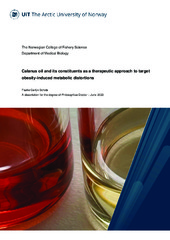| dc.contributor.advisor | Eilertsen, Karl-Erik | |
| dc.contributor.author | Schots, Pauke C. | |
| dc.date.accessioned | 2023-11-10T10:02:04Z | |
| dc.date.available | 2023-11-10T10:02:04Z | |
| dc.date.embargoEndDate | 2025-11-24 | |
| dc.date.issued | 2023-11-24 | |
| dc.description.abstract | Obesity is one of the leading causes for the development of metabolic disorders, such as insulin resistance and type 2 diabetes. Omega-3 fatty acids, found in seafood and marine oils, are shown to reduce obesity, lower blood lipid levels, change the composition of the gut microbiota and reduce the risk for cardiovascular diseases. The increased demand for seafood and marine oils has put pressure on sustainable fisheries, and the marine crustacean Calanus finmarchicus is an alternative and sustainable source of marine lipids. This oil is unique compared to other marine oils, in the sense that more than 85% of the lipids are wax esters, a lipid class where fatty acids are bound to fatty alcohols. The content of EPA and DHA is relatively low, while it is rich in stearidonic acid and monounsaturated fatty acids. In experimental studies, dietary supplementation with Calanus oil was shown to reduce obesity and obesity-related inflammation, improve glycaemic control, and protect the heart after an ischemic event. In this thesis we examined the effect of Calanus oil on obesity-induced alterations of the gut microbiota and, in addition, we wanted to find out whether the wax ester-derived fatty acids were able to protect cardiac H9c2 cells from lipotoxic stress (induced by exposure to palmitic acid). We found that Calanus oil had the tendency to change the microbial composition in the gut towards a healthier phenotype, although the changes were not statistically significant. The Calanus oil wax ester-derived fatty acids effectively, and in a dose-dependent manner, improved cell viability. This effect was associated with increased fatty acid oxidation, which will alleviate the lipotoxic stress in the cells. We conclude that Calanus oil and/or its wax ester-derived fatty acids can be used as a therapeutic approach to target obesity-induced metabolic disorders. | en_US |
| dc.description.abstract | Overvekt er en viktig årsak til utvikling av metabolske forstyrrelser som insulinresistens og type 2 diabetes, og man antar at mer enn 4 millioner mennesker dør hvert år som følge av disse tilstandene. Flere behandlingsregimer har blitt utviklet for å behandle overvekt og medfølgende sykdommer, men få har så langt vist seg å være effektive og/eller trygge.
Omega-3 fettsyrer, som fins i sjømat og marine oljer, har vist seg å forbygge overvekt, senke nivået av fettstoffer i blodet, forbedre sammensetningen av bakteriefloraen i tarmen og redusere risikoen for hjerte- og karsykdommer. Det anbefales derfor å spise to porsjoner fisk/uke eller 250 mg/dag av EPA og DHA, to omega-3 fettsyrer som det fins mye av i sjømat. Imidlertid har økt etterspørsel etter omega-3 fettsyrer lagt press på bærekraftig fiskeri, og det er derfor behov for alternative kilder til disse marine fettsyrene. Den marine krepsdyrarten Calanus finmarchicus er en slik alternativ kilde, og Calanusoljen er unik sammenlignet med andre marine oljer ved at mer enn 85% av oljen består av voksestere hvor fettsyrene er bundet til fettalkoholer. Innholdet av EPA og DHA er forholdsvis lavt, men til gjengjeld er Calanusoljen rik på stearidonsyre (en annen omega-3 fettsyre) og langkjedede enumettede fettsyrer. Eksperimentelle studier på dyr har vist at kosttilskudd med Calanusolje reduser overvekt og tilhørende lavgrads-inflammasjon, bedrer glykemisk kontroll og beskytter hjertet etter kunstig påført infarkt.
Målet med denne avhandlingen var å følge opp de tidligere resultatene for å videre undersøke det terapeutiske potensialet til Calanusoljen og dens bestanddeler (fettsyrer og fettalkoholer) i forbindelse med metabolske komplikasjoner som følge av overvekt. I artikkel 1 gjennomgikk vi tidligere publiserte vitenskapelige artikler (både eksperimentelle og kliniske) om virkningen av fettsyrer og fettalkoholer på overvekts-indusert lavgrads-inflammasjon. I artikkel 2 fant vi at Calanusoljen i bare liten grad endret den mikrobielle sammensetningen i tarmen (mot en sunnere fenotype) hos overvektige mus. Artikkel 3 beskriver en metode (semi-preparativ fastfase ekstraksjon) som vi utviklet for å isolere fettsyrene og fettalkoholene i voksesterne fra Calanusolje. I artikkel 4 fant vi at disse fettsyrene effektivt og på en dose-avhengig måte forbedret overlevelsen til H9c2 hjerteceller som ble eksponert for høye doser av palmitinsyre (mettet fettsyre). Den beskyttende effekten var assosiert med økt fettsyreoksydasjon, som vil redusere såkalt lipotoksisk stress i cellene. Vi konkluderer derfor at inntak av fettsyrene som fins i Calanusoljens voksestere kan brukes som et målrettet terapeutisk prinsipp for å forebygge metabolske forstyrrelser indusert av overvekt. | en_US |
| dc.description.doctoraltype | ph.d. | en_US |
| dc.description.popularabstract | Calanus oil is extracted from the marine zooplankton Calanus finmarchicus and contains several healthy fatty acids - most of them bound to fatty alcohols, forming molecules known as wax esters. We found that dietary intake of low amounts of Calanus oil in obese mice had a positive impact on the intestinal bacterial composition, changing it (to some extent) towards a healthier phenotype. To further study the effect of the Calanus oil wax ester-derived fatty acids. We developed a method to isolate the fatty acids from the fatty alcohols, using solid-phase extraction. We found that this fatty acid cocktail, as well as the most abundant mono- and polyunsaturated fatty acids present in the cocktail, were able protect cardiac cells from so-called lipotoxic stress. The protective effect of the fatty acids was (at least in part) ascribed to a stimulatory effect on the fatty acid oxidation rate, which will reduce the lipid load and production of toxic lipid intermediates in the cell. | en_US |
| dc.description.sponsorship | The work in this thesis was financed by UiT The Arctic University of Norway and the interfaculty MarVal project – From unexploited marine biomass to high value products. Experiments were carried out at the Seafood Science research group, Norwegian College of Fishery Science, Faculty of Biosciences, Fisheries and Economics and the Cardiovascular research group, Department of Medical Biology, Faculty of Health Sciences. | en_US |
| dc.identifier.isbn | 978-82-8266-251-2 | |
| dc.identifier.uri | https://hdl.handle.net/10037/31719 | |
| dc.language.iso | eng | en_US |
| dc.publisher | UiT The Arctic University of Norway | en_US |
| dc.publisher | UiT Norges arktiske universitet | en_US |
| dc.relation.haspart | <p>Paper I: Schots, P.C., Pedersen, A.M., Eilertsen, K.-E., Olsen, R.L. & Larsen, T.S. (2020). Possible Health Effects of a Wax Ester Rich Marine Oil (Review). <i>Frontiers in Pharmacology, 11</i>, 961. Also available in Munin at <a href=https://hdl.handle.net/10037/18699>https://hdl.handle.net/10037/18699</a>.
<p>Paper II: Schots, P.C., Jansen, K.M., Mrazek, J., Pedersen, A.M., Olsen, R.L. & Larsen, T.S. (2020). Obesity-induced alterations in the gut microbiome in female mice fed a high-fat diet are antagonized by dietary supplementation with a novel, wax ester–rich, marine oil. <i>Nutrition Research, 83</i>, 94-107. Also available in Munin at <a href=https://hdl.handle.net/10037/19971>https://hdl.handle.net/10037/19971</a>.
<p>Paper III: Schots, P.C., Edvinsen, G.K. & Olsen, R.L. (2023). A simple method to isolate fatty acids and fatty alcohols from wax esters in a wax-ester rich marine oil. <i>PLOS ONE, 18</i>(5), e0285751. Also available in Munin at <a href=https://hdl.handle.net/10037/29932>https://hdl.handle.net/10037/29932</a>.
<p>Paper IV: Schots, P.C., Li, W., Stoltenberg, A., Lund, T., Larsen., T.S. & Aasum, E. Calanus oil wax ester-derived fatty acids protect H9c2 cardiomyoblasts from palmitate-induced lipotoxicity. (Manuscript). | en_US |
| dc.relation.isbasedon | Schots, P.C., Jansen, K.M., Mrazek, J., Pedersen, A.M., Olsen, R.L. & Larsen, T.S. (2021). Replication Data for: Obesity-induced alterations in the gut microbiomein female mice fed a high-fat diet are antagonized bydietary supplementation with a novel, wax ester–rich, marine oil. DataverseNO, V1, <a href=https://doi.org/10.18710/MMGUFJ>https://doi.org/10.18710/MMGUFJ</a>. | en_US |
| dc.rights.accessRights | embargoedAccess | en_US |
| dc.rights.holder | Copyright 2023 The Author(s) | |
| dc.subject.courseID | DOKTOR-002 | |
| dc.subject | VDP::Medical disciplines: 700::Clinical medical disciplines: 750::Cardiology: 771 | en_US |
| dc.subject | VDP::Medisinske Fag: 700::Klinisk medisinske fag: 750::Kardiologi: 771 | en_US |
| dc.subject | VDP::Medical disciplines: 700::Health sciences: 800::Nutrition: 811 | en_US |
| dc.subject | VDP::Medisinske Fag: 700::Helsefag: 800::Ernæring: 811 | en_US |
| dc.subject | VDP::Technology: 500::Biotechnology: 590 | en_US |
| dc.subject | VDP::Teknologi: 500::Bioteknologi: 590 | en_US |
| dc.subject | VDP::Agriculture and fishery disciplines: 900::Fisheries science: 920::Resource biology: 921 | en_US |
| dc.subject | VDP::Landbruks- og Fiskerifag: 900::Fiskerifag: 920::Ressursbiologi: 921 | en_US |
| dc.title | Calanus oil and its constituents as a therapeutic approach to target obesity-induced metabolic distortions | en_US |
| dc.type | Doctoral thesis | en_US |
| dc.type | Doktorgradsavhandling | en_US |


 English
English norsk
norsk
